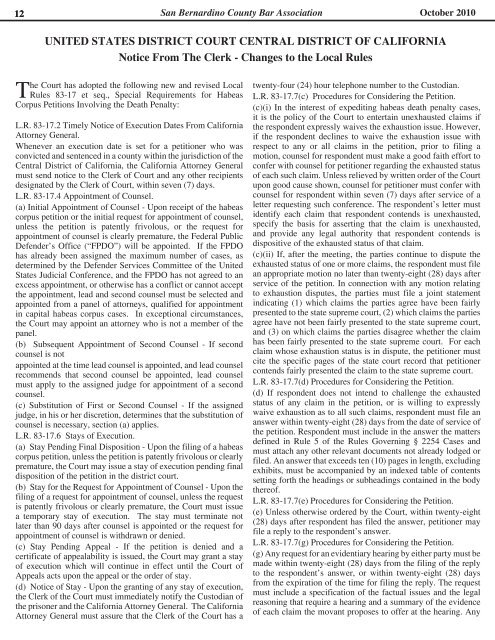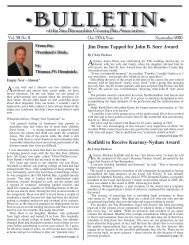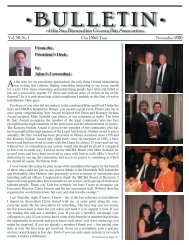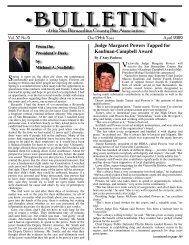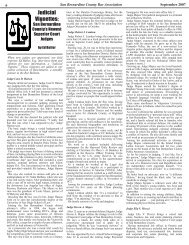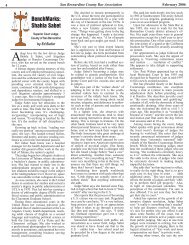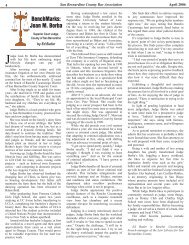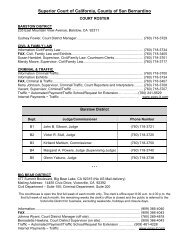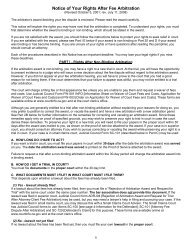October 2010 - San Bernardino County Bar Association
October 2010 - San Bernardino County Bar Association
October 2010 - San Bernardino County Bar Association
You also want an ePaper? Increase the reach of your titles
YUMPU automatically turns print PDFs into web optimized ePapers that Google loves.
12 <strong>San</strong> <strong>Bernardino</strong> <strong>County</strong> <strong>Bar</strong> <strong>Association</strong> <strong>October</strong> <strong>2010</strong><br />
UNITED STATES DISTRICT COURT CENTRAL DISTRICT OF CALIFORNIA<br />
Notice From The Clerk - Changes to the Local Rules<br />
The Court has adopted the following new and revised Local<br />
Rules 83-17 et seq., Special Requirements for Habeas<br />
Corpus Petitions Involving the Death Penalty:<br />
L.R. 83-17.2 Timely Notice of Execution Dates From California<br />
Attorney General.<br />
Whenever an execution date is set for a petitioner who was<br />
convicted and sentenced in a county within the jurisdiction of the<br />
Central District of California, the California Attorney General<br />
must send notice to the Clerk of Court and any other recipients<br />
designated by the Clerk of Court, within seven (7) days.<br />
L.R. 83-17.4 Appointment of Counsel.<br />
(a) Initial Appointment of Counsel - Upon receipt of the habeas<br />
corpus petition or the initial request for appointment of counsel,<br />
unless the petition is patently frivolous, or the request for<br />
appointment of counsel is clearly premature, the Federal Public<br />
Defender’s Office (“FPDO”) will be appointed. If the FPDO<br />
has already been assigned the maximum number of cases, as<br />
determined by the Defender Services Committee of the United<br />
States Judicial Conference, and the FPDO has not agreed to an<br />
excess appointment, or otherwise has a conflict or cannot accept<br />
the appointment, lead and second counsel must be selected and<br />
appointed from a panel of attorneys, qualified for appointment<br />
in capital habeas corpus cases. In exceptional circumstances,<br />
the Court may appoint an attorney who is not a member of the<br />
panel.<br />
(b) Subsequent Appointment of Second Counsel - If second<br />
counsel is not<br />
appointed at the time lead counsel is appointed, and lead counsel<br />
recommends that second counsel be appointed, lead counsel<br />
must apply to the assigned judge for appointment of a second<br />
counsel.<br />
(c) Substitution of First or Second Counsel - If the assigned<br />
judge, in his or her discretion, determines that the substitution of<br />
counsel is necessary, section (a) applies.<br />
L.R. 83-17.6 Stays of Execution.<br />
(a) Stay Pending Final Disposition - Upon the filing of a habeas<br />
corpus petition, unless the petition is patently frivolous or clearly<br />
premature, the Court may issue a stay of execution pending final<br />
disposition of the petition in the district court.<br />
(b) Stay for the Request for Appointment of Counsel - Upon the<br />
filing of a request for appointment of counsel, unless the request<br />
is patently frivolous or clearly premature, the Court must issue<br />
a temporary stay of execution. The stay must terminate not<br />
later than 90 days after counsel is appointed or the request for<br />
appointment of counsel is withdrawn or denied.<br />
(c) Stay Pending Appeal - If the petition is denied and a<br />
certificate of appealability is issued, the Court may grant a stay<br />
of execution which will continue in effect until the Court of<br />
Appeals acts upon the appeal or the order of stay.<br />
(d) Notice of Stay - Upon the granting of any stay of execution,<br />
the Clerk of the Court must immediately notify the Custodian of<br />
the prisoner and the California Attorney General. The California<br />
Attorney General must assure that the Clerk of the Court has a<br />
twenty-four (24) hour telephone number to the Custodian.<br />
L.R. 83-17.7(c) Procedures for Considering the Petition.<br />
(c)(i) In the interest of expediting habeas death penalty cases,<br />
it is the policy of the Court to entertain unexhausted claims if<br />
the respondent expressly waives the exhaustion issue. However,<br />
if the respondent declines to waive the exhaustion issue with<br />
respect to any or all claims in the petition, prior to filing a<br />
motion, counsel for respondent must make a good faith effort to<br />
confer with counsel for petitioner regarding the exhausted status<br />
of each such claim. Unless relieved by written order of the Court<br />
upon good cause shown, counsel for petitioner must confer with<br />
counsel for respondent within seven (7) days after service of a<br />
letter requesting such conference. The respondent’s letter must<br />
identify each claim that respondent contends is unexhausted,<br />
specify the basis for asserting that the claim is unexhausted,<br />
and provide any legal authority that respondent contends is<br />
dispositive of the exhausted status of that claim.<br />
(c)(ii) If, after the meeting, the parties continue to dispute the<br />
exhausted status of one or more claims, the respondent must file<br />
an appropriate motion no later than twenty-eight (28) days after<br />
service of the petition. In connection with any motion relating<br />
to exhaustion disputes, the parties must file a joint statement<br />
indicating (1) which claims the parties agree have been fairly<br />
presented to the state supreme court, (2) which claims the parties<br />
agree have not been fairly presented to the state supreme court,<br />
and (3) on which claims the parties disagree whether the claim<br />
has been fairly presented to the state supreme court. For each<br />
claim whose exhaustion status is in dispute, the petitioner must<br />
cite the specific pages of the state court record that petitioner<br />
contends fairly presented the claim to the state supreme court.<br />
L.R. 83-17.7(d) Procedures for Considering the Petition.<br />
(d) If respondent does not intend to challenge the exhausted<br />
status of any claim in the petition, or is willing to expressly<br />
waive exhaustion as to all such claims, respondent must file an<br />
answer within twenty-eight (28) days from the date of service of<br />
the petition. Respondent must include in the answer the matters<br />
defined in Rule 5 of the Rules Governing § 2254 Cases and<br />
must attach any other relevant documents not already lodged or<br />
filed. An answer that exceeds ten (10) pages in length, excluding<br />
exhibits, must be accompanied by an indexed table of contents<br />
setting forth the headings or subheadings contained in the body<br />
thereof.<br />
L.R. 83-17.7(e) Procedures for Considering the Petition.<br />
(e) Unless otherwise ordered by the Court, within twenty-eight<br />
(28) days after respondent has filed the answer, petitioner may<br />
file a reply to the respondent’s answer.<br />
L.R. 83-17.7(g) Procedures for Considering the Petition.<br />
(g) Any request for an evidentiary hearing by either party must be<br />
made within twenty-eight (28) days from the filing of the reply<br />
to the respondent’s answer, or within twenty-eight (28) days<br />
from the expiration of the time for filing the reply. The request<br />
must include a specification of the factual issues and the legal<br />
reasoning that require a hearing and a summary of the evidence<br />
of each claim the movant proposes to offer at the hearing. Any


